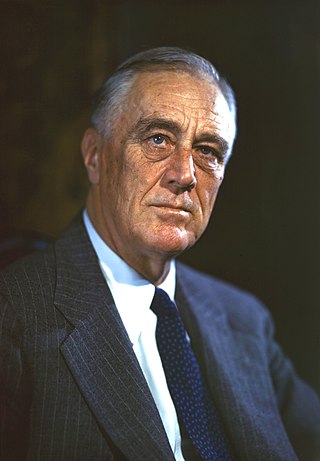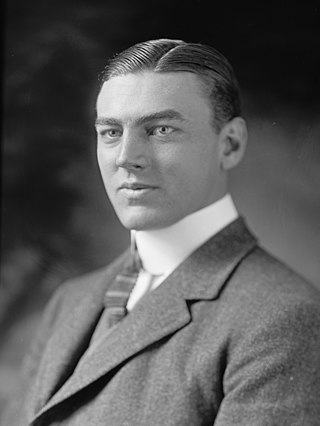Related Research Articles

Franklin Delano Roosevelt, commonly known by his initials FDR, was an American statesman and politician who served as the 32nd president of the United States from 1933 until his death in 1945. He was a member of the Democratic Party and is the only U.S. president to have served more than two terms. His initial two terms were centered on combating the Great Depression, while his third and fourth saw him shift his focus to America's involvement in World War II.

Alfred Mossman Landon was an American oilman and politician who served as the 26th governor of Kansas from 1933 to 1937. A member of the Republican Party, he was the party's nominee in the 1936 presidential election, and was defeated in a landslide by incumbent president Franklin D. Roosevelt.

Hamilton Fish III was an American soldier, author, and politician from New York. He represented New York's 26th congressional district in the Hudson Valley region in the United States House of Representatives from 1920 to 1945. In the second half of his House career, Fish was a chief critic and opponent of President Franklin D. Roosevelt, especially on matters of international affairs and American entry into World War II prior to the attack on Pearl Harbor.
The Worldwar series is the fan name given to a series of eight alternate history science fiction novels by Harry Turtledove. Its premise is an alien invasion of Earth during World War II, and includes Turtledove's Worldwar tetralogy, as well as the Colonization trilogy, and the novel Homeward Bound. The series' time span ranges from 1942 to 2031. The early series was nominated for a Sidewise Award for Alternate History in 1996.

American Empire: The Center Cannot Hold is the second book in the American Empire alternate history series by Harry Turtledove. It takes place during the period of the Roaring Twenties and the Great Depression. During this era in Turtledove's Southern Victory world, the Confederate States of America, stretching from Sonora to Virginia, is led by Whigs while the United States of America is controlled by Socialists.

The Curse of Tippecanoe is an urban legend about the deaths in office of presidents of the United States who were elected in years divisible by 20. According to the legend, Tenskwatawa, leader of Native American tribes defeated in 1811 at the Battle of Tippecanoe by a military expedition led by William Henry Harrison, had cursed the "Great White Fathers".

The Man with the Iron Heart is an alternate history novel by Harry Turtledove. Published in 2008, it takes as its premise the survival by Reinhard Heydrich of his 1942 assassination in Czechoslovakia and his subsequent leadership of the postwar Werwolf insurgency in occupied Germany, which Turtledove depicts as growing into a far more formidable force than was the case historically.

Named the Greatest Briton of all time in a 2002 poll, and widely regarded as being among the most influential people in British history, Winston Churchill has been regularly portrayed in film, television, radio and other media. The depictions range from minor character to the biographical centerpiece, exceeding 30 films, more than two dozen television shows, several stage productions, and countless books.

Joe Steele is an alternate history novel by Harry Turtledove, first published by Roc Books/New American Library in hardcover and ebook form in April 2015. It is an expanded version of the author's 2003 short story of the same name.

The third presidential term of Franklin D. Roosevelt began on January 20, 1941, when he was once again inaugurated as the 32nd president of the United States, and the fourth term of his presidency ended with his death on April 12, 1945. Roosevelt won a third term by defeating Republican nominee Wendell Willkie in the 1940 United States presidential election. He remains the only president to serve for more than two terms. Unlike his first two terms, Roosevelt's third and fourth terms were dominated by foreign policy concerns, as the United States became involved in World War II in December 1941.
The foreign policy of the United States was controlled personally by Franklin D. Roosevelt during his first and second and third and fourth terms as the president of the United States from 1933 to 1945. He depended heavily on Henry Morgenthau Jr., Sumner Welles, and Harry Hopkins. Meanwhile, Secretary of State Cordell Hull handled routine matters. Roosevelt was an internationalist, while powerful members of Congress favored more isolationist solutions in order to keep the U.S. out of European wars. There was considerable tension before the Attack on Pearl Harbor in December 1941. The attack converted the isolationists or made them irrelevant. The US began aid to the Soviet Union after Germany invaded it in June 1941. After the US declared war in December 1941, key decisions were made at the highest level by Roosevelt, Britain's Winston Churchill and the Soviet Union's Joseph Stalin, along with their top aides. After 1938 Washington's policy was to help China in its war against Japan, including cutting off money and oil to Japan. While isolationism was powerful regarding Europe, American public and elite opinion strongly opposed Japan.
The Confederate States of America (1861–1865) only had one president, Jefferson Davis. In various American Civil War alternate histories where the Confederacy won the American Civil War and continued its existence, various people have served in the office of the presidency of the Confederacy.
References
- ↑ Land Leviathan on Fantastic Fiction
- ↑ Published 2010 in Hebrew in Tel Aviv, English and French translation 2011
- ↑ Dan Quayle: President Archived 2012-10-22 at the Wayback Machine
- ↑ "'Watchmen' Trailer: HBO's Damon Lindelof Drama Stands Revealed" by Josh Wigler, Hollywood Reporter, July 20, 2019
- ↑ "Damon Lindelof explains why Watchmen isn't just another dark superhero deconstruction" by Matthew Jackson, SyFy Wire, September 18, 2019
- ↑ Watchmen (TV series) episode "Martial Feats of Comanche Horsemanship"
- ↑ "Every last Watchmen Easter egg and comic reference in episode 3 of the HBO show" by James Grebey, SyFy Wire, November 3, 2019
- ↑ "C.S.A. The Movie Website". Archived from the original on 2007-10-26.
- ↑ "Black Chamber (Tales from the Black Chamber #1)".
- ↑ "Uchronia: Compadres".